John C. Herman – Tobacconist and Mayor of Harrisburg
Posted By Norman Gasbarro on January 23, 2013
During the Civil War, John C. Herman served in Company K, 130th Pennsylvania Infantry, as a Private. He enrolled at York, York County, Pennsylvania, and was mustered into service in Harrisburg, 9 August 1862. By 28 December 1862, he was sick from “hemorrhoids and rheumatism in the back” and was sent to a hospital in Washington, D.C. He was still in the hospital in April 1863. On 21 May 1863, John C. Herman was discharged with his company. The information on his sickness and hospital stay was obtained by York County researcher, Dennis Brandt, and is posted in the database on the York County Heritage Trust web site.
According to information in the Commemorative Biographical Encyclopedia of Dauphin County, page 624, John C. Herman participated in several battles and was suffering from wounds received during the service:
At the breaking out of the war of the Rebellion, Mr. Herman yielded to his patriotic impulses and sentiments, laid aside his business and enlisted in the army in response to the call of President Lincoln. He was enrolled and mustered into company K, One Hundred and Thirtieth Pennsylvania volunteers, and was with his regiment in some of the most hotly contested engagements of the war, conspicuous among which are the battles of Antietam [17 September 1862], Fredericksburg [13 December 1862], and Chancellorsville [2 and 3 May 1863]. He was honorably discharged from the service when his term of enlistment had expired, and returned to the occupations of civil life, bearing in his body the marks of wounds received on the fields of conflict.
The dates of the battle in which he was said to have participated are consistent with time frame stated in the opening paragraph of this blog – he was in the hospital between Fredericksburg and Chancellorsville when the130th Pennsylvania Infantry did not participate in any battle – but no record has been seen of any specific wounds that John C. Herman received as noted in the biographical sketch.
After the Civil War, John C. Herman first returned to his native place of Lewisberry, York County, and began working in the retail tobacco business. Within a short time, he decided to expand the business into the wholesale market. In New York City, he became a partner in the firm of Herman and Hay. Hay subsequently retired and Herman moved the business to Harrisburg – a business which would grow to become one of the most successful wholesale-retail-manufacturing tobacco enterprises in the country.
An early advertisement that appeared in the Harrisburg Patriot on 22 June 1867 is shown above. Undoubtedly, Harrisburg was chosen as the site of the business because of the rail transportation center. Raw materials could easily be obtained from the south via the Northern Central Railroad or from the port at Philadelphia via the Pennsylvania and Reading Railroad. Shipping of the finished product was also facilitated by the railroad connections – west and north from Harrisburg via the Pennsylvania Railroad as well as return rips to Baltimore and Philadelphia on regular trains. Harrisburg’s growing population also provided a good source for labor.
In politics, John C. Herman was a Republican. One of the earliest examples found of his participation in a political event was found in the Harrisburg Patriot of 21 September 1872:
In 1872, the Democrat Party’s candidate for president was Horace Greeley, of New York. Greeley was also the candidate of the Liberal Republicans, a wing of the party that he founded to challenge the corruptness of the Grant administration. Greeley chose as his running mate, B. Gratz Brown, [Note: B. Gratz Brown has been previously mentioned on this blog in relation to his connection to the Gratz family].
John C. Herman was one of the organizers of a march and parade designed to draw attention away from a speech that was to be given by Colonel Charles McClure in support of the Democratic ticket. The diversion was successful. According to the above article, the display “consist[ed] of about nine hundred men and boys, black and white, wearing red and bronzed capes, swinging torches and occasionally throwing a rocket in the air.”
John Ensminger was inside of a banner borne on a wagon and covered with cartoons designed to ridicule Horace Greeley. This banner delighted the aesthetic tastes of the negro voters and of the officers on the hill, who received it with rapturous applause. Horace Greeley was represented as riding a pig (of iron) to the Cincinnati convention….
The article then broke down the participants as follows: “Office holders, national, state, and city…… 150; Boys under 18…… 100; Boys between 18 and 20….. 75; Negroes….. 350; Volunteer white citizens….. 233; Total….. 908.”
The colored citizens were delighted with the pageant. Their officers bore flaming swords. The rank and file in their enthusiasm lighted their lamps before it was quite dark, and the oil in consequence was consumed before the procession was half over. The Lochiel Hotel, the republican headquarters, was brilliantly illuminated, as were the residence of the postmaster and his newspaper office. The enterprising proprietor of the State Capitol Hotel, in his enthusiasm, chopped the limbs off the trees in front of his house so that his brilliant display of Chinese lanterns might dazzle the imagination of the vulgar. He would have chopped the trees down if it had been necessary…. Nearly all the other houses that were illuminated were occupied either by officer holders, candidates or Northern Central employees.
Of course, Grant won the November election and a second term as president. Horace Greeley died in late November 1872. Had he won the election, the presidency may have gone to B. Gratz Brown, his running mate.
The significance of the strong African American support for the Republican Party, particularly in Harrisburg where there was encouragement and participation as in the rally against Horace Greeley, was not lost on men such as John C. Herman. Herman’s time in local politics was just ahead. On 6 January 1881, Harrisburg’s Mayor Patterson resigned, and the parties lined up to name their candidate to vie for his unexpired term of three months, the successor to be elected by representatives of the wards.
John C. Herman secured the position because he then had enough votes from the ward councils, but the matter of the upcoming primary and the general election for a full term loomed ahead. In an article entitled “The Radical Row, The Fight at the Primary Elections, A Bitter Contest and Some Doubt as to Who Will Be Nominated – Herman Leading, but the Opposition Still Confident of Success,” in the Patriot, 31 January 1881, one candidate threatened to run as an Independent if not selected, while it was stated that “Mr. Herman has been most too liberal in his views to suit the straight-laced radicals, has in fact been what is termed an politics a ‘kicker,’ and is not looked upon with an entirely favorable eye….”
Herman did secure the nomination and the difficulties he had in getting it were reported by the Patriot the next day:
HE IS NOMINATED FOR MAYOR BY THE REPUBLICANS
About noon yesterday it became evident to the casual observer, that the time for holding the republican City Convention was near at hand. The “colored vote” had came down town and was congregated in the vicinity of Third and Market Streets and exhibited an unmistakable disposition to “politicate.” All afternoon the various candidates were busy with the delegates…. At 7 o’clock the court house began to fill with men and tobacco smoke, until quite a crowd had pushed forward to the rail surrounding the bar and the atmosphere was very dense.
On the first ballot, Herman received a majority and when a delegate rose to have the nomination made unanimous, he was greeted with a chorus of “noes.” Although the nomination was not unanimously supported by the convention, John C. Herman went on to win the general election and a term as Mayor of Harrisburg.
One of John C. Herman‘s acts as mayor was to issue a proclamation urging citizens to get vaccinated against smallpox. In the proclamation, it was stated that the hospitals would provide the vaccinations to those who could not afford them. Herman noted that of those in the city who were afflicted with the disease, none had been vaccinated. During late 1881, Edmund Umholtz of Gratz, a Civil War veteran, had been appointed Mercantile Appraiser of the County and had to travel to Harrisburg on business. When he returned to Gratz, he fell ill and died on 10 January 1882. After his funeral it was discovered that he had contracted smallpox – which was passed on to several others in Gratz, including two of his children who died, several pall bearers and many others in the borough.
John C. Herman decided to seek a second term and in 1883, the Republican Convention met in February but failed to nominate him. The article (above), appearing in the Patriot on 6 February 1883, pointed out that the “Bad Blood [came] to the Surface in the City Republican Convention.” The opposing faction led by S. Cameron Wilson, hissed and hooted when the incumbent was presented in nomination.
“I nominate John C. Herman, well known to all as a citizen, a business man and a public officer. In glancing over his record as a public servant there is not to be seen a single defect….”
Before the ballot had concluded and when it was found that Wilson had a majority, the way they acted was of the most enthusiastic character. Wilson hats went up, while Herman chins dropped down, and talk of “knifing” was heard at different times.
As in the previous convention, when the move was made to make the nomination unanimous, the hisses and hoots prevailed. The fractures in the Harrisburg Republican Party were evident. John C. Herman completed his term and retired to work at his tobacco business.
From the Patriot, 24 March 1886:
Ex-Mayor John C. Herman, who has been at Atlantic City for the past few weeks for the benefit of his health, returned home yesterday greatly improved. This will be gladful news to the many friends of Mr. Herman, as the condition of that gentleman was considered serious.
John C. Herman died on 17 July 1886 [see: Patriot, 20 July 1886, above]. And, as reported in the Commemorative Biographical Encyclopedia of Dauphin County:
The illness which resulted in his death had its inception in a severe cold contracted in the year previous, which, together with a disease of the heart, baffled all medical skill, and gradually brought him down to the grave. He was well aware of his approaching dissolution, and made ready his affairs, meeting his end with peace and resignation.
John C. Herman was a prominent member of Post No. 58, G.A.R., Harrisburg, and at his funeral, G.A.R. members were present and participants. Prior to his term as mayor, there were only two G.A.R. posts in Harrisburg – No. 58, of which he was a founding member, and No. 116. The “colored” post (Stevens Post No. 520) was formed some time in the 1880s and it is not known what role, if any, Herman had in promoting its organization. Research continues on the role of the Stevens Post No. 520 of Harrisburg because one of its founding members and commander was John Peter Crabb who was born in Gratz Borough. Surely Crabb knew John C. Herman, and as previously noted here on this blog, Crabb was several times a Republican delegate from the 8th Ward – one of the wards where Herman received a great amount of support in his mayoral bids.
Some other men who have a connection to the Lykens Valley area who served in the 130th Pennsylvania Infantry with John C. Herman are:
Alphonso Blake “Blaker Beisel ——- Simon B. Blyler ——- Isaac Bowman ——- William H. Dougherty ——- Abel Fetrow ——- John R. Fetrow ——- Joseph W. Knouff ——– Daniel Koppenhaver ——- Samuel Koppenhaver ——- Charles Kreiner ——- Jacob Lentz ——- John McGann ——- Alexander McLaughlin ——- John Adams Miller ——- Daniel Paul ——- William Scheets ——- Samuel Shoop ——- Robert H. Towson ——- Isaac Uhler ——- William Henry Welker ——- Adam Washington
——————————
News articles are from the on-line resources of the Free Library of Philadelphia. Only a portion of some of the original articles is shown. The complete articles are available in “jpeg” form in project files.
 ;
;
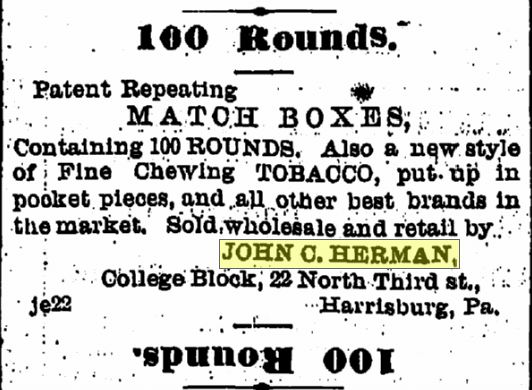
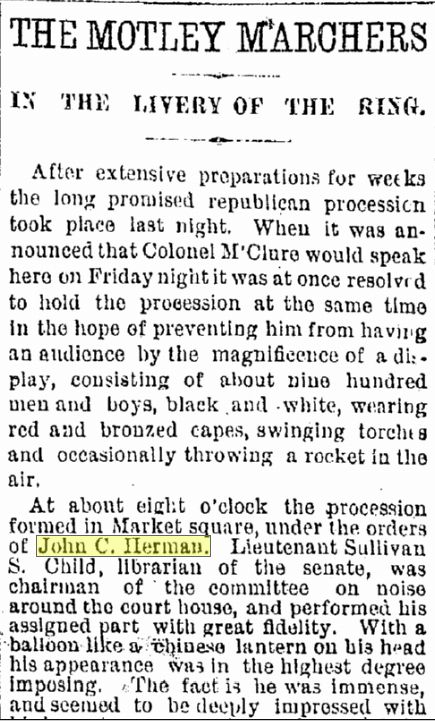
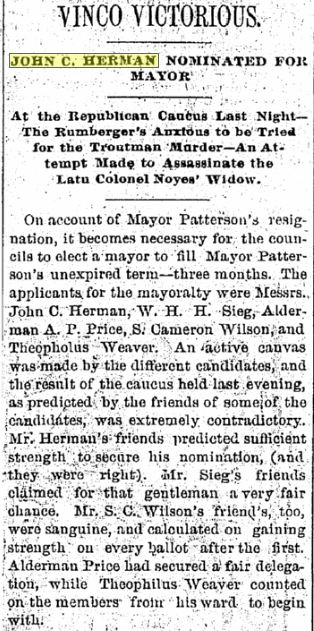
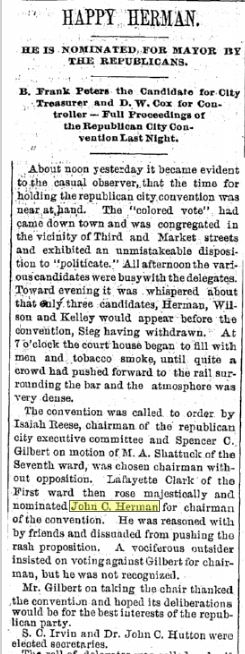
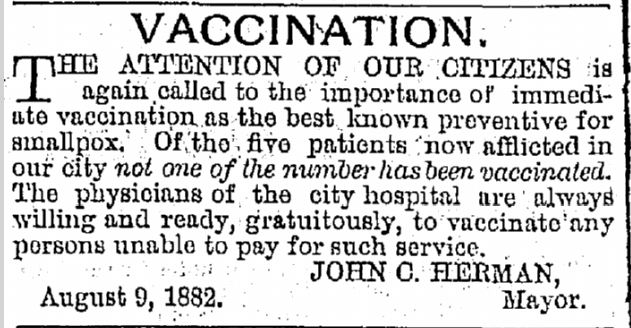
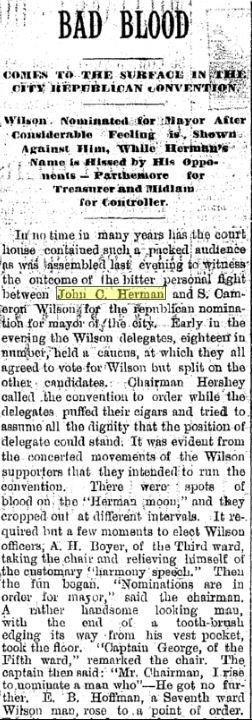
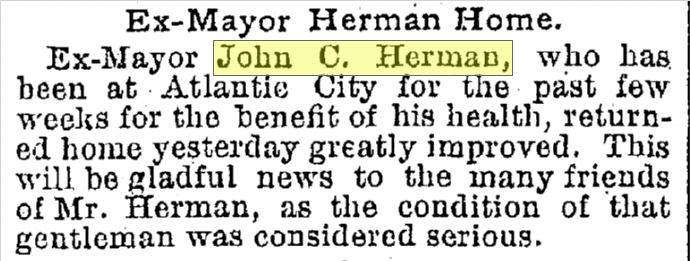



Another exellent article.
Dear Mr. Gasbarro,
As a great-great grandson of John C. Herman, Sr., (he is my “ancestor” as a member of SUVCW, Lincoln-Cushing Camp No. 2) I want to thank you for your extraordinary account of his Civil War service and involvement in Harrisburg politics. Members of the family have copies of his obituary and his entry for the Dauphin County Cyclopedia, and some memorabilia from John C. Herman and Sons, Inc., but your account contains much that is new, and is most welcome. I will share your blog with other descendants of JCH, Sr. Thanks so very much.
Sincerely,
Thomas Neale